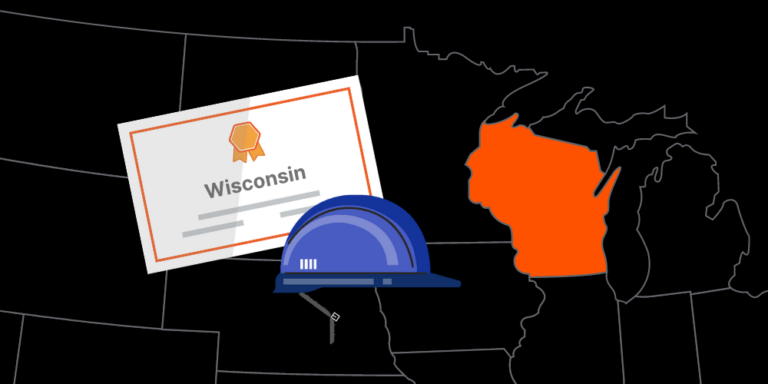

If you're wondering whether you need a contractor license in Wisconsin, the answer is likely yes.
Essentially, anyone working on one to two-family homes, projects worth more than $1,000, or a project that requires a building permit must carry a license. Also, electrical, plumbing, HVAC, asbestos and lead abatement, and well-drilling contractors need to carry licenses.
Outside of those specialty contractors (which always require a license), Wisconsin’s WisBuild website points out this exemption:
"If you are not doing work on one or two-family homes, or you are doing work that does not require you to pull building permits, the state does not require a license for that type of work, but you will still need to comply with any license requirements at the local level."
If you’re considering starting a contracting business in Wisconsin, we've got all of the licensing details you need, so keep reading.
Table of contents
All contractor licensing goes through the State of Wisconsin Department of Safety and Professional Services, with the exact steps varying depending on the types of licenses, detailed below.
Wisconsin doesn’t explicitly offer a general contractor license. Instead, it requires contractors performing the typical duties of a GC to carry a Dwelling Contractor License. In order to get a Dwelling Contractor License, you must first acquire a Dwelling Contractor Qualifier License. To get the Qualifier license, you’ll need a Qualifier Certification.
To obtain a Dwelling Contractor Qualifier Certification, you’ll have to take the state-mandated 12-hour initial training course and pass an exam. At that point, you can apply for a Dwelling Contractor Qualifier license. The course cost varies depending on the provider, but the application fee is $15, and the credential fee is $30.
The Qualifier License allows you to work on one and two-family dwellings, but if you plan to contract, you’ll then need to apply for a Dwelling Contractor license. There are two types of contractor licensing: Dwelling Contractor and Dwelling Contractor Restricted. Restricted licensees can only contract for work valued at less than $25,000. Here are the requirements for those licenses:
Comply with worker’s compensation requirements Comply with unemployment compensation requirements Secure a surety bond of at least $25,000Provide proof of liability insurance of at least $250,000. (Not applicable for Restricted License applicants.)
Submit the application and applicable fees.The fees for Dwelling Contractor Licenses include a $15 application fee, a $25 credential fee, and an annual renewal fee of $25.
As mentioned, licensing for subcontractors also goes through the State of Wisconsin Department of Safety and Professional Services. It’s worth noting that as a specialty contractor, if you’re working on one or two-family dwellings, you must also carry a Dwelling Contractor Qualifier.
Other than the Dwelling Contractor Qualifier license, the application process for electrical contractors is straightforward. Applicants can fill out this application and pay the appropriate fees, which range between $189.13 and $235, depending on the month. While a trade license might not be a requirement for application, it will be a requirement to perform the work.
Plumbing contractors in Wisconsin need to carry the appropriate Dwelling Contractor Qualifier license, as well as employ a master-level plumber. Master plumbers must have at least 1,000 hours of experience as a licensed journeyman per year for three years, or they can possess an engineering degree. They’ll also have to pass an examination before filling out this application. The application fee is $20, the exam fee is $30, and the credential fee is up to $500.
HVAC contractors that work on one and two-family dwellings need to carry a Dwelling Contractor License, but otherwise, applying for a contractor license is straightforward. Applicants will complete this application and pay the fees, which total $175 ($15 for application, and $160 for credentialing).
Regardless of what type of contractor you are, all businesses in Wisconsin need to register with the State of Wisconsin Department of Revenue.
Businesses can use the department's website, create a login, and complete the registration online.
Unlicensed contracting work in Wisconsin is a misdemeanor. This typically means that getting caught contracting without a license could cost you some cash in the form of fines — and possibly some jail time.
The good news is that Wisconsin mechanics lien laws do not explicitly require a contractor to carry a license. But, even though you could still file a lien, it’s rarely a good idea to contract while unlicensed if the state requires one. If the lien doesn’t spur payment during a dispute, you might have to foreclose upon it. The court might not look fondly upon your unlicensed status.